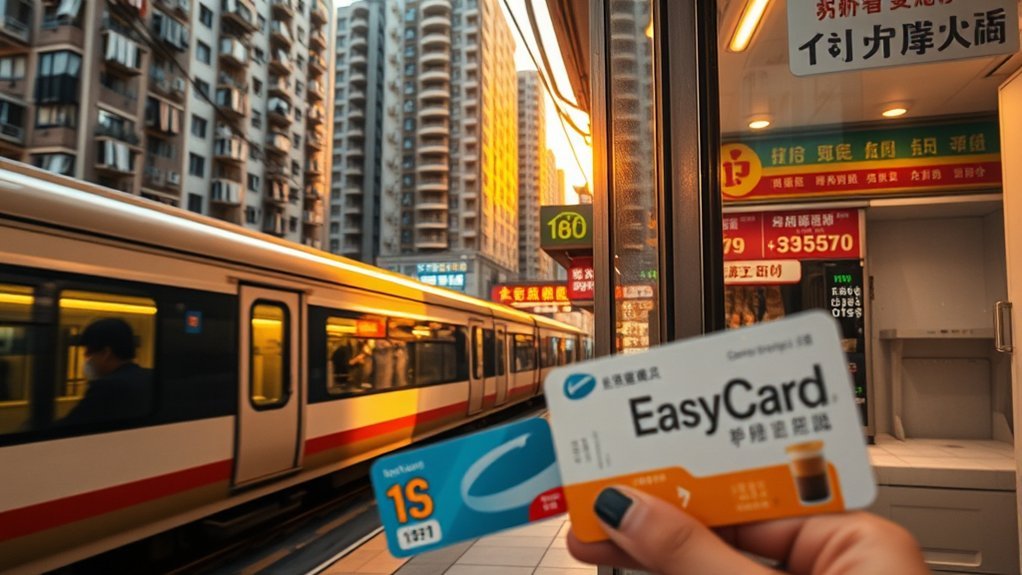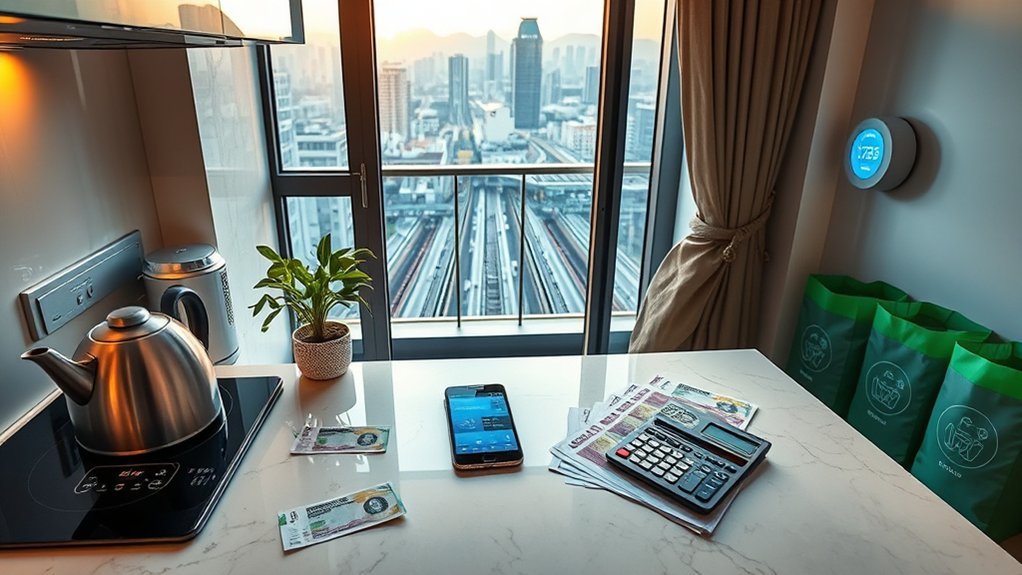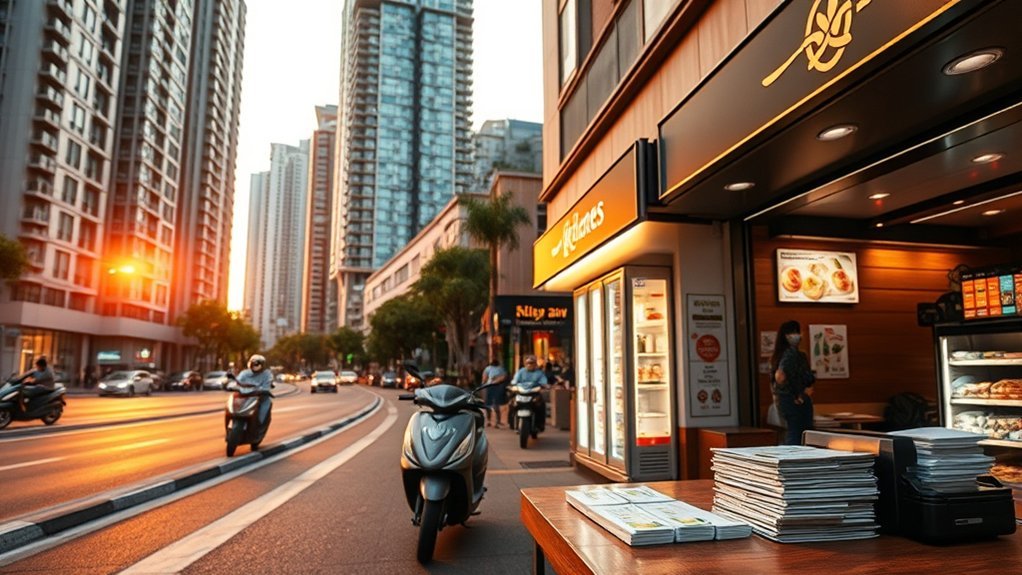You’ll find Taipei markedly affordable: a single person’s baseline (excl. rent) is about NT$13,065, while a family of four averages NT$47,937. City-center one‑bedrooms typically run NT$15,000–26,000 and can consume roughly half a local salary (avg NT$51,000). Utilities plus internet are ~NT$3,200, MRT monthly passes ~NT$1,280, and meals at night markets often fall under NT$200. Below are practical breakdowns and neighborhood tips if you want more detail.
Overview of Taipei’s Cost of Living and Budget Benchmarks

Curious how far your money will go in Taipei? You’ll see the cost of living is modest: a single person spends about NT$13,065 monthly (excluding rent), while a family of four needs roughly NT$48,000. Compared to New York, Taipei’s overall cost of living (ex. rent) is about 45% cheaper, and rent in Taipei runs approximately 78% lower.
Daily food benchmarks reinforce affordability: a mid-range three-course meal for two is NT$1,200–2,000, a McMeal NT$140, and white rice NT$95/kg. Essential utilities for an 85 m2 apartment average NT$2,400/month, with internet at NT$800/month.
City-center apartment listings range from NT$24,500 for a one-bedroom to NT$53,600 for three bedrooms, indicating variation by size and location. Additionally, property costs in different areas can offer varying prices that reflect local economic conditions. Use the single-person and family benchmarks plus these specific prices to model monthly budgets and compare living standards against other global cities.
Housing: Renting, Buying and Neighborhood Comparisons

How much you’ll pay for housing in Taipei depends on location, size and whether you rent or buy: city‑center one‑bedrooms typically range from NT$15,000–26,000 (average ~NT$24,500), while outskirts offer NT$10,000–20,000 (average ~NT$18,000); three‑bedroom units run about NT$53,600 in center versus NT$35,000 outside. You’ll compare rental prices against an average net monthly salary of NT$51,000 to judge affordability; central one‑bedrooms can consume half your income, while outskirts free up budget. Additionally, understanding the general maintenance expenses of maintaining a home can help you create a more accurate budget for living in Taipei.
Neighborhood comparisons should weigh condition, commute and resale value: central districts command higher per‑m2 purchase prices (~€11,400/m2) and better maintenance, outskirts span €3,175–€14,400/m2 with variable quality. If you plan a longer stay, use an agent to navigate listings and spot dilapidated units.
Buying suits those prioritizing stability and capital appreciation; renting gives flexibility but requires monitoring rent‑to‑salary ratios. Compare specific districts on transport, amenities and price per m2 before deciding.
Monthly Utilities and Ongoing Household Expenses

Wondering what utilities will add to your monthly Taipei budget? For an 85 m2 apartment expect electricity, heating/cooling, water and garbage to average about 2,400 NT$ monthly. Add internet (60 Mbps+, unlimited) at roughly 800 NT$, and your baseline utilities + internet come to about 3,200 NT$.
Compare that to rent: a 1‑bed in the city center averages 24,500 NT$, while outside center it’s 18,000 NT$. Utilities and internet therefore represent about 13% of a city‑center rent and about 18% of an outside‑center rent, making them a meaningful, but predictable, portion of costs. Ongoing household expenses tend to track these estimates closely; fluctuations come mainly from seasonal cooling/heating use. When budgeting, treat the 3,200 NT$ figure as a conservative monthly line item you’ll regularly pay on top of rent, not including groceries, transport, or discretionary spending. Additionally, regular maintenance on appliances can help reduce unexpected repair costs and ensure efficiency in your household expenses.
Groceries, Markets and Typical Food Prices

You’ll find food options in Taipei range from budget night market bargains to higher-priced supermarket staples. A three-course meal for two runs about 1,200–2,000 NT$, while essentials like 1 kg of rice (95 NT$), a loaf of bread (57 NT$) and a cappuccino (117 NT$) show supermarket pricing that’s often higher than wet market produce. Compare night markets and wet markets for fresher, cheaper vegetables and seafood versus convenience and packaged goods at supermarkets. Additionally, consider the cost implications of dining out frequently to better manage your budget.
Night Market Bargains
Looking for budget-friendly food in Taipei? You’ll find Night markets, grocery budgeting and casual meals that beat supermarket prices: many stalls at Shilin, Raohe Street, and Ningxia sell items under NT$160 (approx. $5), and typical night-market meals cost a fraction of sit-down restaurants. Use night markets for ready-to-eat savings and occasional produce bargains; they’re ideal for daily dining and impulse buys. For regular grocery budgeting, compare night-market prices against Carrefour for packaged goods — Carrefour is often pricier for some staples. Wet markets (covered elsewhere) supply the cheapest high-quality protein and dairy, so combining wet-market fresh items with night-market snacks maximizes savings. Overall, night markets lower your per-meal cost and add cultural value while keeping monthly food expenses predictable.
Wet Market Freshness
How much can you save by shopping Taipei’s wet markets? You’ll typically pay 10–40% less for fresh produce, meat and dairy than at supermarkets, making wet markets an efficient way to cut grocery bills without sacrificing quality. Daytime vendors sell locally sourced perishable goods with more bargaining room, so unit costs for rice, vegetables and lean meats trend lower.
- Compare unit prices: wet markets vs. supermarkets (avg −20%).
- Protein options: high-quality meat/dairy at lower prices.
- Convenience: daytime hours, complementary to department stores.
- Extras: Shilin, Raohe Street, Ningxia offer affordable street food and fresh items.
Use wet markets to lower weekly food spend while maintaining freshness and variety.
Eating Out, Night Markets and Dining on a Budget

Want cheap, tasty meals in Taipei? You’ll find night markets, dining on a budget that beat many Western cities on price and variety. Cheap meals start around NT$200 (approx $6); a McMeal is about NT$140, while many stall snacks or lunch plates sit near NT$150–200. Compare that to a mid-range three-course meal for two at ~NT$1,500 — street food saves you roughly 80-90%.
Beverages: a 0.5L mid-range beer costs ~NT$60–100 (supermarket) or NT$170 (bar) and a cappuccino ~NT$120, so factor drinks into per-meal math. Shilin and Raohe offer the widest selections and seasonal discounts; wet markets supply cheaper fresh produce and protein than supermarkets for daily cooking. Department stores and supermarkets sell nonperishables more cheaply than convenience stores, but wet-market fresh buys lower your cooked-meal cost significantly. If you want maximum savings, combine wet-market shopping with night-market eating: you’ll lower monthly food spend while sampling Taipei’s most cost-effective cuisine. Additionally, using cost-effective methods like street food can help you maintain a budget while enjoying diverse culinary experiences.
Local Transportation, Commuting and Travel Costs

You’ll find Taipei’s public transport is very affordable: single rides average 20–65 NT$ on the MRT with one-way tickets starting at 20 NT$ and monthly passes around 1,280 NT$ (TPASS). Taxis start at 85 NT$ plus roughly 25 NT$ per kilometer, so frequent cab use quickly outpaces transit costs. Given reliable service and multi-day MRT passes, planning around transit can make location less critical for commuting expenses. It’s also important to consider potential additional maintenance that may arise if you purchase a scooter or car.
Public Transport Prices
Curious how much commuting will add to your budget? You’ll find Taipei’s public transport efficient and affordable — the EasyCard works across metro and buses, and fares are low compared with many global cities. Here’s a concise breakdown:
- One-way local ride: 20–65 NT$ (≈ $0.65–$2.00 depending on distance and zone).
- Monthly commuter pass: 1,280 NT$ — cost-effective if you commute daily.
- Short-term visitors: 24/48/72-hour passes available, useful versus single fares for sightseeing.
- Regional travel: Long-distance trains start at 40 NT$ and reach up to 1,530 NT$ based on distance.
You’ll save most by using an EasyCard and monthly pass for regular commutes; public transport beats frequent taxi use on cost.
Taxi & Fuel Costs
How much will taxis and fuel add to your Taipei budget? A Taxi starts at 85 NT$ with 25 NT$/km, so short trips (3–5 km) typically cost 160–210 NT$, making taxis expensive compared with a 20 NT$ one-way local transport ticket or a 1,280 NT$ monthly pass. If you rely on taxis daily, expect costs to surpass metro/bus commuting quickly: ten 200 NT$ rides a week ≈ 8,000 NT$/month.
Fuel costs vary but factor into car ownership alongside utilities. For intercity travel, long-distance train fares run 40–1,530 NT$, offering cheaper alternatives for longer trips. Use taxi selectively; for regular transportation, metro/bus passes are far more cost-effective.
Healthcare, Insurance and Medical Expense Considerations

Why does healthcare in Taipei feel both reassuring and risky? You get broad National Health Insurance coverage (after 6 months of residency) and solid local care, yet wait times and the possibility of costly evacuations create real risk. Local doctor visits average about 1,500 TWD (uninsured) or 200 TWD (insured); online consultations run near 6,000 TWD.
For planning, consider:
- Compare NHI-covered services versus private options to estimate out-of-pocket medical expenses.
- Factor in typical visit costs (200–1,500 TWD depending on insurance status).
- Prioritize health insurance that includes emergency medical evacuation—costs can range from roughly USD 25,000 to USD 120,000.
- Evaluate expat-specific plans (e.g., Good Neighbor Insurance) for evacuation and international coverage versus domestic-only policies.
You should treat local care as affordable and reliable for routine needs, but buy comprehensive international health insurance to prevent catastrophic financial exposure in emergencies. Additionally, understanding potential hidden costs in medical care can help you make more informed financial decisions.
Education, Childcare and Family-Related Costs

Wondering how much raising kids in Taipei will add to your monthly bills? Your family-of-four budget is cited around €3,400 monthly versus a single-person €1,100 baseline, so education and childcare form a meaningful slice of that gap. Public education costs are modest thanks to universal systems and NHI for health-related expenses, but you’ll still budget for supplies, meals and extracurriculars.
Childcare varies: private daycare and international schools push costs higher, especially if you live in city-center flats where rent ranges €460–€750 for one-bedroom units; moving outside can free up funds for tuition or after-school programs.
Food and groceries take about 40% of some family budgets, affecting school meal and snack spending.
With average salary near €1,680 (approx NT$57,000), plan household allocations carefully: education and childcare will be significant line items when comparing single-earner versus dual-earner scenarios and when choosing between public options and pricier private/international alternatives. Additionally, understanding household operational expenses can help families budget more effectively for their overall living costs in the city.
Tips for Saving Money and Finding Affordable Services

Many expats cut monthly housing costs by choosing outskirts or shared flats—rent in Taipei’s city center runs NT$15,000–26,000 while outskirts drop to NT$10,000–20,000, and splitting a two-bedroom can bring your share to roughly NT$15,000. You’ll save most by comparing center vs outskirts and testing short-term Airbnb stays before committing, since listings vary from well-maintained to dilapidated. Use data to prioritize: rent, commute time, and transit costs.
- Compare rents across neighborhoods using listing aggregates to spot NT$ differences quickly.
- Use Airbnb as a temporary baseline, then negotiate long-term leases after inspecting units.
- Maximize Public Transportation: one-way NT$20+ or a NT$1,280 monthly pass plus EasyCard convenience to cut commuting cost per trip.
- Share services (bulk groceries, pooled utilities) and keep international health insurance despite lower local care to avoid high emergency evacuation expenses.
Make choices by quantifying monthly totals; small per-item savings compound into significant monthly reductions.
Frequently Asked Questions
How Much Money Do You Need to Live Comfortably in Taipei?
You’d need roughly 60,000–80,000 NT$ monthly to live comfortably in Taipei. That covers modest 1‑bed rent, utilities, transport, groceries; more like 100,000+ NT$ if you want larger space, dining out, and savings.
How Much Does It Cost to Rent in Taipei?
You’ll pay roughly 15,000–26,000 TWD/month for a one‑bedroom in Taipei city center, 10,000–20,000 outside; three‑bedrooms average ~53,600 TWD center versus ~35,000 TWD outside, so rents are far cheaper than New York.
How Much Is a 3 Bedroom Apartment in Taiwan?
A 3-bedroom in Taiwan costs about NT$53,600/month in Taipei city center and roughly NT$35,000/month outside center; you’ll pay a clear premium downtown, often taking a large share of an average NT$51,000 monthly salary.
Can Americans Live in Taipei?
Yes — you’ll find Taipei affordable and accessible; with rent roughly 78% lower than New York and living costs 45% cheaper (excluding rent), you can comfortably live there on an average local salary and moderate budgeting.
Conclusion
In Taipei you’ll likely spend more on housing than anywhere else in your budget: rent can take up 30–40% of monthly expenses compared with 20–25% in many mid-sized Asian cities. That means prioritizing location or flatmates will cut costs fastest. Use the city’s efficient transport and night markets to trim food and commuting bills, and compare utility providers annually—small percentage savings compound into meaningful monthly relief.


